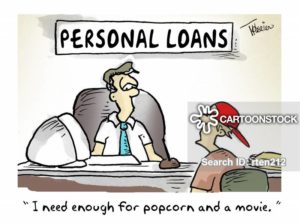November 24, 2020
 A personal loan is money that is borrowed for your personal purpose which mainly includes debt consolidation, student loan, unexpected medical bill or even buying a new appliance. The money is returned by you with interest in monthly installments from time to time which usually lasts from two to five years. As has been seen, nowadays most of the personal loans are unsecured which means that they are not backed up by the collateral. APR is known as the annual percentage rate which determines the interest you pay on that loan. There is no fixed APR and may vary from scenario to scenario but it ranges from around 6% to 36% with an average of around 9.41%. APR depends upon your income, credit score, debt, and creditworthiness. If you were looking to apply for a personal loan and didn’t know how to apply for it then you have come to the right place. This article will guide you through how to apply for a personal loan.
A personal loan is money that is borrowed for your personal purpose which mainly includes debt consolidation, student loan, unexpected medical bill or even buying a new appliance. The money is returned by you with interest in monthly installments from time to time which usually lasts from two to five years. As has been seen, nowadays most of the personal loans are unsecured which means that they are not backed up by the collateral. APR is known as the annual percentage rate which determines the interest you pay on that loan. There is no fixed APR and may vary from scenario to scenario but it ranges from around 6% to 36% with an average of around 9.41%. APR depends upon your income, credit score, debt, and creditworthiness. If you were looking to apply for a personal loan and didn’t know how to apply for it then you have come to the right place. This article will guide you through how to apply for a personal loan.
How To Qualify For A Personal Loan
There are many things and steps that shall be kept in mind in order to qualify for a personal loan. For example, if a person wants to borrow a loan for remodeling his house or buying a new car, then the equity loan would surely come with a lower interest rate. These are not like unsecured personal loans as you are not solely judged on creditworthiness. On the other hand, these instant cash loans are secured by the home you want to remodel or the car you want to buy.
Decide How Much To Borrow
One should be definite enough to determine how much exact money that he needs to borrow. One should definitely keep in mind that you don’t need to just repay the original loan but you have to repay along with the interest. A sane person would not borrow extra money just so that he would pay interest on money that he would not need. This is the reason why you should decide on how much money to borrow. One should also make sure that he would be able to afford the payment with all the interest including. It has been seen that in many cases, people opt for way too high instant cash loans and are unable to pay back in the end which not might end up good.
Check Your Credit
It is of no surprise that instant cash loans heavily rely on creditworthiness. One should check their credit scores and should obtain the credit reports from each of the three major credit reporting agencies such as Equifax, TransUnion, and Experian. Referred to as soft inquiries, none of these actions will impact your credit score. It will only impact when you apply for a loan and lenders opts for a hard inquiry. There are many credit card and loan companies out there which provide free monthly credit score which is found beneficial for applying for an instant cash loan.
Tags:
budgeting,
credit,
economy,
Interest Rates,
loans,
money,
Mortgage interest rates,
personal finance
November 22, 2020
 Although many people think saving and investing are very similar to one another, there are some key differences.
Although many people think saving and investing are very similar to one another, there are some key differences.
By being aware of those differences you may change your mind when deciding which action to take.
We listed some pros and cons of both saving and investing to help you to weigh which is the better solution for you.
Similarities and differences between saving and investing
The thing that connects the two is that they are both strategies to accumulate money! Saving or investing both imply putting your money aside for potential future needs.
They can both protect you from debt. However, if you find yourself in that situation, be active in the process and claim Payment protection insurance if needed.
The difference between the two is the type of assets used in the account.
Another one is that if you want to be able to use the cash quickly, save (but it can also be done for some long-term future plans).
If you don’t want to play it safe and your desire is achieving a higher return – invest!
Where to go?
Savers – go to a bank or a credit union and open a saving account. When opening a saving account, look for the APY (highest annual percentage yield) to maximize your earnings.
Investors – open an account with an independent broker, which includes mutual funds, bonds, stocks and exchange-traded funds. Also, keep in mind when investing that you should invest only the money you won’t be needing any time soon.
You should keep your funds in the investment for at least 3 to 5 years minimum.
Are there some risks?
While investing, you should always think twice before doing something. Saving is safe with the minimum amount of risk – it is very easy to do and the chance of losing money is equal to zero.
You are always familiar upfront with how much you will earn in your balance.
On the other hand, investing is always unpredictable and you have to be aware of the risk of potentially losing everything, but also of earning a lot more!
When talking about risk, the thing that needs to be mentioned is the price of saving and investing. Saving is not expensive, since opening an account is free.
But, you have to keep in mind some unpredictable factors such as inflation. Saving doesn’t protect you from it, while investing potentially can save you (if you think in a long-term period).
How should I decide whether I should save or invest?
This decision should be based on your wishes and needs.
If you’re looking for earning money and taking risks that can possibly have very good or very bad consequences, you should invest.
If you are thinking about putting some money aside just in case you might need it someday and you want to be able to use your money whenever you need it, you should save.
This decision is not always easy. Thinking it thoroughly, make the best decision for yourself. It can be a lot easier than you think – contact Optimal Solicitors in Manchester, they know what to do!
Tags:
budgeting,
Earnings,
financial planning,
income,
insurance,
investments,
money,
personal finance,
savings
November 10, 2020
 In most cases, buyers’ offers have home inspections contingencies included. This means that, in making a deal, you have the right to inspect the property and, if needed, back out of the deal if the results are unsatisfactory.
In most cases, buyers’ offers have home inspections contingencies included. This means that, in making a deal, you have the right to inspect the property and, if needed, back out of the deal if the results are unsatisfactory.
Wanting an inspection shows you are a serious buyer so it can never be a bad idea.
Located in Šibenik, Terra Dalmatica offers you a hand in finding your perfect home! Giving every client an individual approach, we can together discover an ideal solution for you.
The condition of a home
Before the final answer, you have to be aware of repairs and costs your future home may require. Safety comes first, right?
Detecting problems such as carbon monoxide, radon or mould can be crucial in cancelling your offer.
Thinking ahead can save you from surprises and unforeseen legal problems.
Every room in your house needs a proper permit, otherwise, it can affect your taxes and insurance.
A space for improvement
Exercising your right for a home inspection leaves you the space to negotiate for a better deal or price reduction. Diagnosing the current condition of water heater, plumbing, and other installations helps you make budget plans.
Stick to your criteria and determine a cost over which you are not willing to go. Don’t purchase a home that is in the condition you are not personally satisfied with!
Trust a home inspector
A home inspector is your person of trust. He or she is a professional who can help and suggest some future actions – saving time and money, maintaining your home etc.
Buying a home can be one of the biggest steps in your life so don’t underestimate the importance of all the nuances of your home’s picture.
Be aware of the chance that, even though your home has the perfect colour walls and is in the perfect distance from your work, it may hide a lot deeper problems.
Insurance
By skipping a home inspection you can find yourself in a position in which you may not get some certification or documentation needed for home insurance.
This is why a home inspector plays an important role in your future!
Be responsible
If you buy a home without previously inspecting it, there is not much to do about it at this point.
Home inspections cost around 200-500$ – paying this amount can protect you from potentially a lot bigger costs in the future.
Should you skip a home inspection? No!
The reasons above give you an unambiguous answer – never skip a home inspection!
The risk from setting your money for home inspection aside, even if it turns out everything in your home is in a perfect condition, is much smaller than the risk of not being prepared for greater amounts of money you may pay for repairs your home might need.
The decision you make should be based on your wishes and standards – the professionals in Terra Dalmatica are always at your disposal. Find your perfect home – make all your wishes come true!
Tags:
budgeting,
economy,
Home Insurance,
loans,
money,
mortgage,
real estate
November 2, 2020
 At a time when many businesses are restructuring and many more shutting down for good, the current health pandemic we find ourselves in the midst of doesn’t seem like the rosiest time to be launching a business, does it?
At a time when many businesses are restructuring and many more shutting down for good, the current health pandemic we find ourselves in the midst of doesn’t seem like the rosiest time to be launching a business, does it?
Thing is, though, while it may appear like you’re going against the grain, starting an NYC moving company during Covid-19 may not be such a bad idea after all.
Reason?
Well, for one, 2020 has seen an exodus of New Yorkers fleeing the city in favor of more affordable states like Pennsylvania, with others venturing further out interstate. The moving business, deemed an essential service in New York, has therefore witnessed a major boom during the pandemic.
So, won’t the bubble burst?
Well, the thing about NYC is that the moving industry here is very well developed compared to most other parts of the country. While Covid-19 may have prompted many to pull up stakes, moving in NYC is generally a thriving business all year round.
If you suddenly find yourself with more time on your hands during this period, or have lost a job, or probably made a resolution during the lockdown to start a side hustle, there are few better business ideas right now than starting a moving company.
Question is, what exactly do you need to do to get the business off the ground?
Step-by-Step Guide to Starting a Moving Business in NYC
Here are the most important points you will need to address when starting a moving company in NYC.
1. It all starts with a business plan. Create a solid business plan that addresses everything from the structure of the business, to the source of funding, the list of services you’ll be offering, an analysis of the market, analysis of the competition, your marketing plan, sales strategy and financial projections. Be thorough with your business plan as it will serve as a handbook by which you’ll run your business.
2. Get a business permit.
3. Invest in moving equipment. Purchase a van or truck or find someone who could use the extra funds to rent you one. Other equipment you’ll need include moving containers and boxes, dollies, packing and wrapping material, ropes, belts and padding. The aim should be to provide exceptional service, so it’s imperative that you look and act like a professional. Branded gear, including clothing, is a bonus.
4. The best way to run a moving business is as a licensed, professional company. Register with the USDOT and get all the necessary licensing and insurance.
5. Insure yourself. Get liability and cargo insurance to be on the safe side in case of potential losses.
6. If you’re considering storage services as part of your menu, find a secure, easily accessible space to rent. This, along with the moving truck(s) will be your biggest expenses, especially if you’re purchasing the truck/van, more so a new one.
7. Next, hire some personnel as you cannot run a moving business on your own. If you’re on a budget, consider, for instance, an able-bodied relative or close friend who has the time.
8. Promote your business. Once you’ve launched the business, you’ll need to advertise your services and get the word out there. Adopt a marketing strategy that includes a mix of both online and offline marketing methods for best effect. As well, join some local moving associations who can be a good source of leads and insights that can open your eyes.
9. Lastly, as we alluded to earlier, if you want to thrive in this sector, make customer satisfaction your top priority. That includes dispensing first-class service, offering attractive rates with NO hidden costs, and carrying yourself with professionalism. Customer recommendations will be your biggest marketing tool, so go out of your way to add a smile to every client you serve.
Tags:
Business,
expenses,
money,
savings
 A personal loan is money that is borrowed for your personal purpose which mainly includes debt consolidation, student loan, unexpected medical bill or even buying a new appliance. The money is returned by you with interest in monthly installments from time to time which usually lasts from two to five years. As has been seen, nowadays most of the personal loans are unsecured which means that they are not backed up by the collateral. APR is known as the annual percentage rate which determines the interest you pay on that loan. There is no fixed APR and may vary from scenario to scenario but it ranges from around 6% to 36% with an average of around 9.41%. APR depends upon your income, credit score, debt, and creditworthiness. If you were looking to apply for a personal loan and didn’t know how to apply for it then you have come to the right place. This article will guide you through how to apply for a personal loan.
A personal loan is money that is borrowed for your personal purpose which mainly includes debt consolidation, student loan, unexpected medical bill or even buying a new appliance. The money is returned by you with interest in monthly installments from time to time which usually lasts from two to five years. As has been seen, nowadays most of the personal loans are unsecured which means that they are not backed up by the collateral. APR is known as the annual percentage rate which determines the interest you pay on that loan. There is no fixed APR and may vary from scenario to scenario but it ranges from around 6% to 36% with an average of around 9.41%. APR depends upon your income, credit score, debt, and creditworthiness. If you were looking to apply for a personal loan and didn’t know how to apply for it then you have come to the right place. This article will guide you through how to apply for a personal loan.



Recent Comments